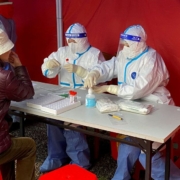Shanghai set out plans on May 16 for the end of a painful COVID-19 lockdown that has lasted more than six weeks, heavily bruising China’s economy, and for the return of more normal life from June 1.
Biden marks 1 million Americans dead from COVID
Congress, Coronavirus Disease (COVID-19) Pandemic, Coronavirus Disease 2019 (COVID-19), Coronavirus Disease 2019 (COVID-19), Coronavirus Infections, Coronavirus Mutations, Coronavirus Restrictions, Coronavirus surge, COVID-19 booster shots, COVID-19 Deaths, COVID-19 Infections, COVID-19 shots, COVID-19 Therapeutic, COVID-19 therapeutic candidates, COVID-19 Therapeutics, COVID-19 Therapies, COVID-19 treatment pill, COVID-19 vaccination rates, Covid-19 Variants, Joe Biden, Pandemics, Reuters Tally, SARS-CoV-2 virus, Severe Acute Respiratory Syndrome Coronavirus 2 (SARS-CoV-2), Summits, United States, White House, White House coronavirus task forcePresident Joe Biden on May 12 commemorated the death of 1 million people in the United States from COVID-19, marking what he called “a tragic milestone” and urging Americans to “remain vigilant” amid the ongoing pandemic.
Texas doctor calls U.S. COVID deaths nearing 1 million ‘mindblowing’
“Long-Haul” COVID-19, Asymptomatic Patients, BNT162b2 (Pfizer and BioNTech), Breakthrough COVID-19, Coronavirus Disease (COVID-19) Pandemic, Coronavirus Disease 2019 (COVID-19), Coronavirus Restrictions, Coronavirus surge, Coronavirus Vaccines, COVID guidelines, COVID-19 anti-vaxxers, Covid-19 asymptomatic infections, COVID-19 cases, COVID-19 Deaths, Covid-19 fatality rate, COVID-19 inoculations, COVID-19 misinformation, COVID-19 Prevention Measures, COVID-19 protocols, COVID-19 recommendations, COVID-19 risk, COVID-19 Severe Complications, COVID-19 Vaccines, Deaths, Janssen COVID-19 Vaccine (J&J), Mask-wearing, mRNA-1273/Moderna COVID-19 Vaccine (Moderna), Pandemics, Therapeutics, Vaccines, Vaxzevria (previously COVID-19 Vaccine AstraZeneca)In the early days of the COVID-19 pandemic, pulmonologist Joseph Varon offered an opinion that made headlines around the world and went viral on social media. Varon was fighting two wars, he said: one against COVID and one against stupidity.
Italy on April 1 began to phase out the country’s COVID-19 restrictions, ending a state of emergency public authorities declared more than two years ago that allowed it to bypass bureaucracy and swiftly impose rules via decrees.
China’s financial hub of Shanghai launched a two-stage lockdown of its 26 million residents on March 28, closing bridges and tunnels and restricting highway traffic in a scramble to contain surging COVID-19 cases.
Shanghai’s bespoke approach to tackling coronavirus outbreaks is coming under strain as new cases rise in the Chinese metropolis, with authorities reluctant to impose a comprehensive lockdown as other cities have done.
Hong Kong reported more than 20,000 new coronavirus cases on March 18 as health experts called for a clear way out of a “zero COVID” policy that has left the city isolated.
U.S. health officials said on February 16 they are preparing for the next phase of the COVID-19 pandemic as Omicron-related cases decline, including updating CDC guidance on mask-wearing and shoring up U.S. testing capacity.
Washington, D.C. will no longer require people show proof of COVID-19 vaccination to enter many businesses beginning on February 15, its mayor said, joining a slew of local leaders who are dialing back pandemic restrictions as the Omicron wave ebbs.
Many countries have not reached their peak in cases of the highly transmissible Omicron variant of the coronavirus and measures imposed to curb its spread should be eased slowly, the World Health Organization’s technical lead on COVID-19 said on Feb. 1.




 Reuters
Reuters




